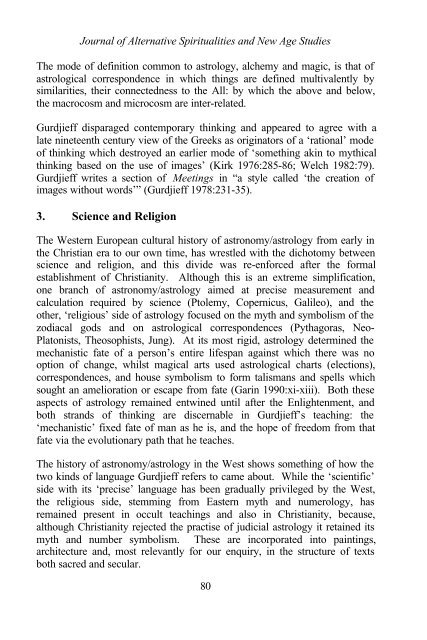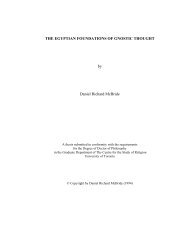Gurdjieff, 'Old' or 'New Age': Aristotle or Astrology? Sophia ...
Gurdjieff, 'Old' or 'New Age': Aristotle or Astrology? Sophia ...
Gurdjieff, 'Old' or 'New Age': Aristotle or Astrology? Sophia ...
You also want an ePaper? Increase the reach of your titles
YUMPU automatically turns print PDFs into web optimized ePapers that Google loves.
Journal of Alternative Spiritualities and New Age Studies<br />
The mode of definition common to astrology, alchemy and magic, is that of<br />
astrological c<strong>or</strong>respondence in which things are defined multivalently by<br />
similarities, their connectedness to the All: by which the above and below,<br />
the macrocosm and microcosm are inter-related.<br />
<strong>Gurdjieff</strong> disparaged contemp<strong>or</strong>ary thinking and appeared to agree with a<br />
late nineteenth century view of the Greeks as <strong>or</strong>iginat<strong>or</strong>s of a ‘rational’ mode<br />
of thinking which destroyed an earlier mode of ‘something akin to mythical<br />
thinking based on the use of images’ (Kirk 1976:285-86; Welch 1982:79).<br />
<strong>Gurdjieff</strong> writes a section of Meetings in “a style called ‘the creation of<br />
images without w<strong>or</strong>ds’” (<strong>Gurdjieff</strong> 1978:231-35).<br />
3. Science and Religion<br />
The Western European cultural hist<strong>or</strong>y of astronomy/astrology from early in<br />
the Christian era to our own time, has wrestled with the dichotomy between<br />
science and religion, and this divide was re-enf<strong>or</strong>ced after the f<strong>or</strong>mal<br />
establishment of Christianity. Although this is an extreme simplification,<br />
one branch of astronomy/astrology aimed at precise measurement and<br />
calculation required by science (Ptolemy, Copernicus, Galileo), and the<br />
other, ‘religious’ side of astrology focused on the myth and symbolism of the<br />
zodiacal gods and on astrological c<strong>or</strong>respondences (Pythag<strong>or</strong>as, Neo-<br />
Platonists, Theosophists, Jung). At its most rigid, astrology determined the<br />
mechanistic fate of a person’s entire lifespan against which there was no<br />
option of change, whilst magical arts used astrological charts (elections),<br />
c<strong>or</strong>respondences, and house symbolism to f<strong>or</strong>m talismans and spells which<br />
sought an ameli<strong>or</strong>ation <strong>or</strong> escape from fate (Garin 1990:xi-xiii). Both these<br />
aspects of astrology remained entwined until after the Enlightenment, and<br />
both strands of thinking are discernable in <strong>Gurdjieff</strong>’s teaching: the<br />
‘mechanistic’ fixed fate of man as he is, and the hope of freedom from that<br />
fate via the evolutionary path that he teaches.<br />
The hist<strong>or</strong>y of astronomy/astrology in the West shows something of how the<br />
two kinds of language <strong>Gurdjieff</strong> refers to came about. While the ‘scientific’<br />
side with its ‘precise’ language has been gradually privileged by the West,<br />
the religious side, stemming from Eastern myth and numerology, has<br />
remained present in occult teachings and also in Christianity, because,<br />
although Christianity rejected the practise of judicial astrology it retained its<br />
myth and number symbolism. These are inc<strong>or</strong>p<strong>or</strong>ated into paintings,<br />
architecture and, most relevantly f<strong>or</strong> our enquiry, in the structure of texts<br />
both sacred and secular.<br />
80










